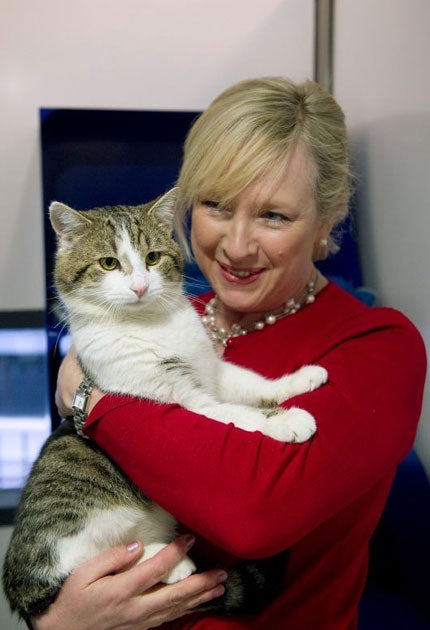Mary Dejevsky: So you think you donate to charity?
Notebook

On my desk is a letter from Crisis thanking me for a contribution and outlining where their money goes. Don't get me wrong, both the letter and the information are welcome; not everyone is so conscientious. But I also received a press release outlining a host of new projects, to be delegated to other groups and largely funded by the Department for Communities and Local Government – which slightly surprised me.
I had this idea that Crisis, laudable organisation that it is, raised its own funds and sent out its own volunteers. This starts to alter my image of the charity: from a front-line operator, has it become more of a co-ordinator? As for money, that's what I thought donors were for.
The delegation of funds and services, I'm beginning to grasp, is quite a trend. Have you, I wonder, been as puzzled as I have by the howls from charities that claim to be the first victims of council spending cuts? Naïvely, I thought that charities raised money from you and me, through appeals, flag days, and – oh dear – paid-for "chugging".
Well, many still do. But it also turns out that many also tender, in effect, for contracts with local councils. One in four charities with income of more than £100,000 receive the bulk of their funding from the public sector. Lo and behold, when council money is tight, these semi-detached groups are the first to be let go.
But if they are tendering for council contracts, how far can these organisations still describe themselves as charities, as the public might understand the word? Are they not arms of local authorities, providing services at or below cost?
Are they not closer to being what, in the United States, are called not-for-profit organisations than actual charities? And is there not a distinction here?
Incidentally, I thought contracting services out to charities was the Conservatives' big idea, but it turns out New Labour was doing it, too. It gets more complicated – or, as I would see it from my untutored perspective, worse. Through contracts or donations, charities have money to spend, as suppliers well know.
So a symbiotic relationship develops between certain charities and certain businesses.
Where you or I might hope that a business might be prevailed upon to supply a charity at a discount or even free, things may actually happen the other way round, with the charity providing a lifeline for a business.
Take the recent fuss about Booktrust. Who stood to lose most if the Government halted support for a "free" children's book scheme? The children, yes, but also the authors and publishers whose work was chosen. Why was the Government ever subsidising this? If it was a charity, how come it relied on government money and why weren't publishers prevailed on to supply the books for free?
Last week, Col Tim Collins – he of the inspirational pre-Iraq speech to his men – gave another glimpse into the confused world of British charity. In a special BBC Panorama documentary, "Forgotten Heroes", he looked at the plight of ex-servicemen suffering from post-traumatic stress syndrome.
Almost as a footnote, he mentioned the proliferation of groups set up to help ex-servicemen, but – careful not to sound ungrateful – also the scale of duplication and wasted effort. Clearly, there's little wrong with the British desire to give; it's what happens afterwards that needs attention.
The politeness of old England
A by-product of my current restricted mobility (I have a broken foot) is the discovery of morning radio phone-ins. And what has struck me, aside from the seemingly infinite variety of things my compatriots are prepared to talk about – a single morning offered a choice between cosmetic surgery (with special reference to buttocks), Cameron's Big Society, and under-achievement at school – is the residual politeness of Middle England.
While the presenters encourage callers to weigh right in, there is invariably a pause, while Steve, Anne or Liz, or whoever is on the line, says a very proper "Good Morning" or "How are you?" You find it with interviewees on news programmes, too.
The callers don't speak in a spirit of reprimand; rather they seem to feel that this is the correct preface to a conversation with someone they don't really know.
Nor is it limited to Radio 4's much-criticised demographic, it's across ages and across the board.
I find it rather endearing that this vestige of old-fashioned manners has survived the 30-year onslaught of informality, and offer this thought to presenters: maybe they should try saying "Good morning" first.
A new rat-catcher at No 10
Delighted to learn that the Camerons have acquired a cat, and not just any cat, but one with a model PC pedigree: mixed heritage (tabby), disadvantaged (a stray from the Battersea Dogs and Cats Home), and an unimpeachably classless name (Larry). Not many party political points for Ed Miliband to score there.
But I can't help recalling the old American saw, attributed to Harry Truman: if you want a friend in Washington, get a dog.
As Bill Clinton did at the time of his greatest presidential troubles – remember Buddy, the chocolate Labrador? As Barack Obama did when criticised for aloofness – enter Bo, a cuddly Portuguese water dog. So I wonder, did that sleek black rat run across Downing Street by itself, or was it let loose by an inspired PR in nice time for the television news? If you want a diversion in Westminster, replace the cat!

Join our commenting forum
Join thought-provoking conversations, follow other Independent readers and see their replies